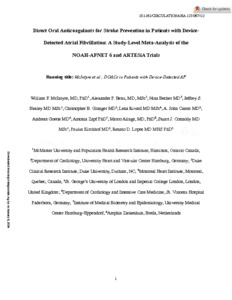McIntyre, WF;
Benz, AP;
Becher, N;
Healey, JS;
Granger, CB;
Rivard, L;
Camm, AJ;
Goette, A;
Zapf, A;
Alings, M;
et al.
McIntyre, WF; Benz, AP; Becher, N; Healey, JS; Granger, CB; Rivard, L; Camm, AJ; Goette, A; Zapf, A; Alings, M; Connolly, SJ; Kirchhof, P; Lopes, RD
(2024)
Direct Oral Anticoagulants for Stroke Prevention in Patients with Device-Detected Atrial Fibrillation: A Study-Level Meta-Analysis of the NOAH-AFNET 6 and ARTESiA Trials.
Circulation, 149 (13).
pp. 981-988.
ISSN 1524-4539
https://doi.org/10.1161/CIRCULATIONAHA.123.067512
SGUL Authors: Camm, Alan John
![[img]](https://openaccess.sgul.ac.uk/115979/1.hassmallThumbnailVersion/mcintyre-et-al-2023-direct-oral-anticoagulants-for-stroke-prevention-in-patients-with-device-detected-atrial.pdf)  Preview |
|
PDF
Accepted Version
Available under License ["licenses_description_publisher" not defined].
Download (2MB)
| Preview
|
Abstract
Background: Device-detected atrial fibrillation (AF) (also known as subclinical AF or atrial high-rate episodes) is a common finding in patients with an implanted cardiac rhythm device and is associated with an increased risk of ischemic stroke. Whether oral anticoagulation is effective and safe in this patient population is unclear. Methods: We performed a systematic review of MEDLINE and Embase for randomized trials comparing oral anticoagulation to antiplatelet or no antithrombotic therapy in adults with device-detected AF recorded by a pacemaker, implantable cardioverter-defibrillator, cardiac resynchronization therapy device or implanted cardiac monitor. We used random-effects models for meta-analysis and rated the quality of evidence using the GRADE framework. The review was pre-registered (PROSPERO CRD42023463212). Results: From 785 unique citations, we identified two randomized trials with relevant clinical outcome data; NOAH-AFNET 6 (2,536 participants) evaluated edoxaban and ARTESiA (4,012 participants) evaluated apixaban. Meta-analysis demonstrated that oral anticoagulation with these agents reduced ischemic stroke (relative risk [RR] 0.68, 95% confidence interval [CI] 0.50-0.92; high-quality evidence). The results from the two trials were consistent (I2 statistic for heterogeneity=0%). Oral anticoagulation also reduced a composite of cardiovascular death, all-cause stroke, peripheral arterial embolism, myocardial infarction or pulmonary embolism (RR 0.85, 95% CI 0.73-1.00, I2=0%; moderate-quality evidence). There was no reduction in cardiovascular death (RR 0.95, 95% CI 0.76-1.17, I2=0%; moderate-quality evidence) or all-cause mortality (RR 1.08, 95% CI 0.96-1.21 I2=0%; moderate-quality evidence). Oral anticoagulation increased major bleeding (RR 1.62, 95% CI 1.05-2.5 I²=61%; high-quality evidence). Conclusions: The results of the NOAH-AFNET 6 and ARTESiA trials are consistent with each other. Meta-analysis of these two large randomized trials provides high-quality evidence that oral anticoagulation with edoxaban or apixaban reduces the risk of stroke in patients with device-detected AF and increases the risk of major bleeding.
| Item Type: |
Article
|
| Additional Information: |
This is a non-final version of an article published in final form in McIntyre, WF; Benz, AP; Becher, N; Healey, JS; Granger, CB; Rivard, L; Camm, AJ; Goette, A; Zapf, A; Alings, M; et al. (2024) Direct Oral Anticoagulants for Stroke Prevention in Patients with Device-Detected Atrial Fibrillation: A Study-Level Meta-Analysis of the NOAH-AFNET 6 and ARTESiA Trials. Circulation, 149 (13). pp. 981-988. |
| Keywords: |
1102 Cardiorespiratory Medicine and Haematology, 1103 Clinical Sciences, 1117 Public Health and Health Services, Cardiovascular System & Hematology |
| SGUL Research Institute / Research Centre: |
Academic Structure > Molecular and Clinical Sciences Research Institute (MCS) |
| Journal or Publication Title: |
Circulation |
| ISSN: |
1524-4539 |
| Language: |
eng |
| Publisher License: |
Publisher's own licence |
| PubMed ID: |
37952187 |
| Dates: |
| Date |
Event |
| 2024-03-26 |
Published |
| 2023-11-12 |
Published Online |
| 2023-11-07 |
Accepted |
|
 |
Go to PubMed abstract |
| URI: |
https://openaccess.sgul.ac.uk/id/eprint/115979 |
| Publisher's version: |
https://doi.org/10.1161/CIRCULATIONAHA.123.067512 |
Statistics
Item downloaded times since 09 Jan 2024.
Actions (login required)
 |
Edit Item |



